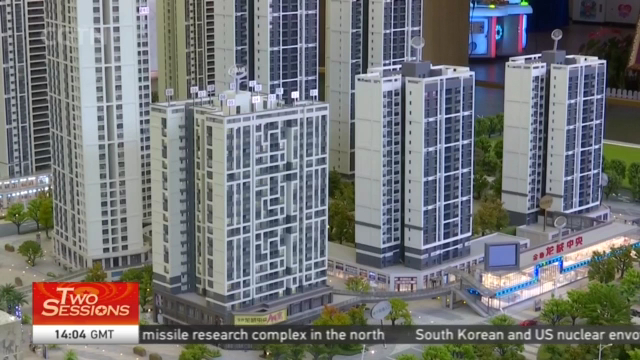
22:45, 07-Mar-2019
Real Estate Policy: Measures taken to create a stable market
Updated
22:40, 10-Mar-2019
03:17

The sun may be starting to set on China's booming real estate market. However, worries over property bubbles and soaring prices have prompted the government to take several market-taming measures to tame the market. CGTN's Cui Hui'ao tells us how that goal can be achieved.
China's once red hot housing market is starting to cool.
At this downtown Beijing real estate agency, manager Liu Jingli says housing prices in and around the city's Central Business District have dropped 20 percent within the last year. The transaction volume has doubled over the same period.
LIU JINGLI MANAGER, CENTALINE PROPERTY "More people are buying houses to improve their living conditions, replacing smaller apartments with bigger ones."
Liu says in the past, 30 to 40 percent housing demand came from speculative buyers. But now 90 percent is driven by personal use.
LIU JINGLI MANAGER, CENTALINE PROPERTY "Speculators now have little incentive now due to restrictions such as higher down payments, heavy taxes imposed, and the closure of the fake divorce loophole. There is little profit left to be had."
Since 2017, Chinese authorities have rolled out a slew of measures against speculative buying and potential bubbles. The message is clear: houses are built to be inhabited.
On top of these restrictive policies, China has been rapidly expanding its rental housing sector.
More than 200 million people nationwide rent their homes, adding up to a market with a value estimated to exceed one trillion yuan.
For example, city dweller Zhou Ke now lives in a two-story rented apartment with his wife.
ZHOU KE BEIJING RESIDENT "The space is big enough to accommodate me, my wife and our kid. Our parents can visit and stay with us too. We did a calculation: to buy an apartment like this, it would cost us around 10 million RMB, but now I only pay 2000 yuan per month for rent thanks to public accumulation funds."
LOU JIANBO PROFESSOR OF REAL ESTATE LAW, PEKING UNIVERSITY "When the purchase market cools down, more people choose to rent housing. From the economic perspective, a mature rental market helps contain price fluctuations. These two markets supplement each other."
At last year's Central Economic Work Conference, policymakers again called for a long-term mechanism to maintain the sound development of the real estate market.
Professor Lou says the key is combining market forces and government supply.
LOU JIANBO PROFESSOR OF REAL ESTATE LAW, PEKING UNIVERSITY "Previously most of the measures focused only on the demand side, like curbing speculation. But increasing affordable housing supply and a robust public rental housing program are equally important. The government is now doing both."
CUI HUI'AO BEIJING "China's Real Estate industry enjoyed a golden era for over a decade starting from the late 1990s. However, the days of the nation's GDP relying excessively on real-estate investment appear to be over. China is now striving for a consumption and innovation-driven growth. And for the real estate sector, a stable market has become the new target. Cui Hui'ao, CGTN, Beijing."

SITEMAP
Copyright © 2018 CGTN. Beijing ICP prepared NO.16065310-3
Copyright © 2018 CGTN. Beijing ICP prepared NO.16065310-3